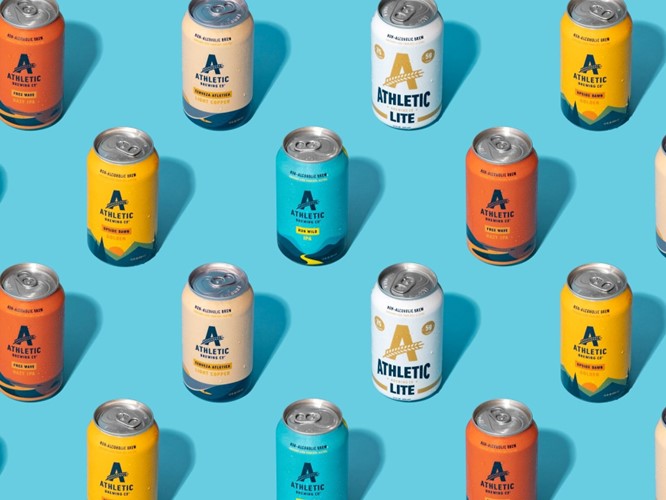The ‘Life Hack’ That Inspired Athletic Brewing Company’s CEO to Reinvent the Beer Market

Andrew Crawford, Managing Director and Global Head of Consumer at General Atlantic, recently spoke with Athletic Brewing Company Co-founder and CEO Bill Shufelt about how health and wellness trends are reshaping the beverage sector.
Athletic Brewing Company is America’s largest dedicated non-alcoholic brewer. General Atlantic acquired a minority stake in the company in 2024.
Andrew Crawford: Bill, take us back to your job in finance and the decision to start a company.
Bill Shufelt: I was an accidental entrepreneur. I was a trader at a hedge fund – the seat I’d wanted since I was 20 years old – and thought I’d do that for the rest of my life.
At the time, I was out to four or five work dinners a week. When I started to run ultramarathons, and those lifestyles didn’t mesh.. I cut out alcohol while training for my first ultramarathon and it was the biggest life hack I’d ever discovered. I thought, “People are definitely going to decline their alcohol usage in the future.”
But there were no high-quality offerings. If you wanted to not drink at a work dinner 10 years ago in New York City, you were on the kids’ menu looking at Shirley Temples or diet sodas. I wanted a sophisticated adult drink that didn’t exist. I was complaining and my wife told me, “You should fix it.” This entrepreneurial fire suddenly started to burn, and it hasn’t gone out since.
Crawford: You also manufacture your own product, which is unique in your industry. This was something that we were very attracted to. Why did you make the early decision to own the process?
Shufelt: Most brands are going about the category with very light investment, keeping traditional brewing methods, and going hard with sales. They are putting new wrappers on old stuff. We knew we had to reinvent how non-alcoholic beer was made to create a high-quality product.
For nine months, we experimented with the fermentation process and came up with a proprietary, brand-new approach that allows us to keep alcohol levels very low without compromising taste. Once we had it, we wanted to ring-fence it. We knew it was something special and we didn’t trust outsourcing it. So, we made the decision to do heavy manufacturing, and we are currently building our fourth brewery.
Investing in manufacturing was tough. For the first three years, the breweries were not operating at full utilization. But now that we’re scaled, those investments are starting to pay off, and I think that moat should get bigger.
Crawford: How did you find your customers? Who were some of the first retailers that got on board?
Shufelt: I thought, “Where do I shop?” and walked into my local Whole Foods. They sent me to the buyer in Brooklyn. I gave her an unlabeled bottled beer to taste, and she loved it. From one store in Brooklyn, Whole Foods took us national. That Brooklyn location now sells over 1,000 cases [of Athletic beer] a quarter.
But I also knew that no one was walking into mainstream grocery stores looking at the non-alcoholic beer shelf. We had to get people interested.
We started offering thousands of samples at sporting events, every weekend, that were within a six-hour drive of my house. Some people were immediately excited, and others were total haters. From there, we kept working on building and expanding our core consumer base.
Crawford: Where is non-alcoholic beer headed in the US? What does it look like in other parts of the world?
Shufelt: When I first went out to raise money, non-alcoholic beer was 0.3 percent of beer sales in the United States. In Europe, it was 5 percent overall, reaching 15 percent in Spain and Germany.
In 2021, non-alcoholic beer was 3 percent of Whole Foods’s total beer sales. That jumped to 8 percent in 2022, 13 percent in 2023, and this January, it passed 20 percent for the first time.
These generational changes are happening faster than anyone thinks. Typical big beer producers have lost 10 percent of their volume in the last three years and over 30 percent in the past decade. Non-alcoholic beer is a life raft for the industry and points to a healthier future.
Crawford: How have health and wellness trends shifted since you started Athletic Brewing? Where do you see them going in the future?
Shufelt: In the early days of my finance career, it was a badge of honor to be at boozy client dinners all the time. But then everyone became more receptive to gathering at SoulCycle or Barry’s Bootcamp.
Technology has played a big role. We are only 15 years into having smartphones in our pockets and information at our fingertips. Millions of people are having a similar realization to the one I had, and that will influence their choices as consumers.
Crawford: Has your vision for Athletic Brewing evolved as you’ve built the brand?
Shufelt: From day one at Athletic, our goal has been to create a brand that travels – across states, across borders. The name “Athletic” isn’t tied to a specific geography, country, or population. We’re not just building a company; we’re building a movement. It’s meant to be a global brand, which makes General Atlantic a natural partner for us on our journey.

Sector: Consumer
Region: United States
Year GA Invested: 2024
Athletic Brewing Company is a manufacturer of non-alcoholic craft beer and sparkling hop water.
